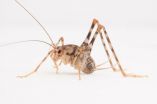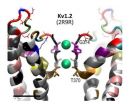(Press-News.org) Passerine birds, also known as perching birds, that migrate by night tend to fly faster in spring than they do in autumn to reach their destinations. This seasonal difference in flight speed is especially noticeable among birds that only make short migratory flights, says researcher Cecilia Nilsson of Lund University in Sweden, in Springer's journal Behavioral Ecology and Sociobiology.
Nilsson, in a group led by professor Thomas Alerstam, used a tracking radar to measure over three years the speed by which birds flew over Falsterbo Peninsula, a bird migratory hot spot in south-western Sweden. The seasonal differences they found correspond with those recorded for other nocturnal passerine migrants at other sites in southern and northern Sweden.
The seasonal differences in airspeed are more noticeable among short distance migrant birds. Nilsson and colleagues suspect that such birds fly faster in spring because they have a greater urgency to reach their breeding grounds first and to choose the best territories, mates and other resources. While the time savings made in spring might seem miniscule, these remain important because they influence the arrival order of individual birds. In autumn, the birds take things more slowly because they are not as pressured to reach their winter grounds.
Wind is the one weather condition that influences birds' decisions the most about when to take off. In fact, Nilsson and co-authors discovered that passerine birds can actually fine-tune their flights to make full use of winds, making their flying and subsequent migration easier. Short distant migrants have higher ground speeds (speed relative to the ground below) than airspeeds (own speed relative to the air around the bird) in both seasons. Hence, these birds make use of wind assistance. In contrast, long distance migrants often travel with airspeeds exceeding ground speeds, resulting from flying in headwinds, in autumn. These findings correlate with previous studies done at the University of Lund which showed that long distance migrants receive very little wind assistance on average.
Nilsson and colleagues also found that short distance migrants have a more flexible flight schedule, because they are able to wait for good nights. Long distance migrants on the other hand must fly on more nights to reach their destination in good time, even if it means traveling during unfavourable wind conditions. While waiting for nights with good wind conditions will save them energy, it will prolong their migration.
"These results indicate surprisingly fine-tuned seasonal modulation of airspeed and responses to wind. Associated with different behavioural strategies, passerine birds thus are adapted to different levels of time selection pressures during spring and autumn migration," Nilsson summarizes.
INFORMATION:
Reference
Nilsson, C. et al. (2014). Seasonal modulation of flight speed among nocturnal passerine migrants: differences between short- and long-distance migrants. Behavioral Ecology and Sociobiology. DOI 10.1007/s00265-014-1789-5
The full-text article and the image are available to journalists on request.
Migrating birds sprint in spring, but take things easy in autumn
Short-distance migratory birds have the luxury to wait until winds are just right
2014-09-02
ELSE PRESS RELEASES FROM THIS DATE:
Nano-forests to reveal secrets of cells
2014-09-02
Vertical nanowires could be used for detailed studies of what happens on the surface of cells. The findings are important for pharmaceuticals research, among other applications. A group of researchers from Lund University in Sweden have managed to make artificial cell membranes form across a large number of vertical nanowires, known as a 'nano-forest'.
All communication between the interior of a cell and its surroundings takes place through the cell membrane. The membrane is a surface layer that holds the cell together and that largely comprises lipids, built of fatty ...
Scientists find possible neurobiological basis for tradeoff between honesty, self-interest
2014-09-02
What's the price of your integrity? Tell the truth; everyone has a tipping point. We all want to be honest, but at some point, we'll lie if the benefit is great enough. Now, scientists have confirmed the area of the brain in which we make that decision.
The result was published online this week in Nature Neuroscience.
"We prefer to be honest, even if lying is beneficial," said Lusha Zhu, the study's lead author and a postdoctoral associate at the Virginia Tech Carilion Research Institute, where she works with Brooks King-Casas and Pearl Chiu, who are assistant professors ...
Researchers find Asian camel crickets now common in US homes
2014-09-02
With their long, spiky legs and their propensity for eating anything, including each other, camel crickets are the stuff of nightmares. And now research from North Carolina State University finds that non-native camel cricket species have spread into homes across the eastern United States.
"The good news is that camel crickets don't bite or pose any kind of threat to humans," says Dr. Mary Jane Epps, a postdoctoral researcher at NC State and lead author of a paper about the research.
The research stems from a chance encounter, when a cricket taxonomist found an invasive ...
Exceptionally well preserved insect fossils from the Rhône Valley
2014-09-02
In Bavaria, the Tithonian Konservat-Lagerstätte of lithographic limestone is well known as a result of numerous discoveries of emblematic fossils from that area (for example, Archaeopteryx). Now, for the first time, researchers have found fossil insects in the French equivalent of these outcrops - discoveries which include a new species representing the oldest known water treader.
Despite the abundance of fossils in the equivalent Bavarian outcrops, fewer fossils have been obtained from the Late Kimmeridgian equivalents of these rocks in the departments of Ain and Rhône ...
Surprising new role for calcium in sensing pain
2014-09-02
DURHAM, N.C. -- When you accidentally touch a hot oven, you rapidly pull your hand away. Although scientists know the basic neural circuits involved in sensing and responding to such painful stimuli, they are still sorting out the molecular players.
Duke researchers have made a surprising discovery about the role of a key molecule involved in pain in worms, and have built a structural model of the molecule. These discoveries, described Sept. 2 in Nature Communications, may help direct new strategies to treat pain in people.
In humans and other mammals, a family of ...
Single laser stops molecular tumbling motion instantly
2014-09-02
In the quantum world, making the simple atom behave is one thing, but making the more complex molecule behave is another story.
Now Northwestern University scientists have figured out an elegant way to stop a molecule from tumbling so that its potential for new applications can be harnessed: shine a single laser on a trapped molecule and it instantly cools to the temperature of outer space, stopping the rotation of the molecule.
"It's counterintuitive that the molecule gets colder, not hotter when we shine intense laser light on it," said Brian Odom, who led the research. ...
NYU study compares consequences of teen alcohol and marijuana use
2014-09-02
Growing public support for marijuana legalization in the U.S. has led to public debate about whether marijuana is "safer" than other substances, such as alcohol. In January, President Obama also publically stated he is not convinced that marijuana is more dangerous than alcohol. Despite the recent shift in views toward marijuana, the harms of use as compared to alcohol use are not well understood.
Now a new study "Adverse Psychosocial Outcomes Associated with Drug Use among US High School Seniors: A Comparison of Alcohol and Marijuana," by researchers affiliated with ...
Discovery hints at why stress is more devastating for some
2014-09-02
Some people take stress in stride; others are done in by it. New research at Rockefeller University has identified the molecular mechanisms of this so-called stress gap in mice with very similar genetic backgrounds — a finding that could lead researchers to better understand the development of psychiatric disorders such as anxiety and depression.
"Like people, each animal has unique experiences as it goes through its life. And we suspect that these life experiences can alter the expression of genes, and as a result, affect an animal's susceptibility to stress," says senior ...
Simple awareness campaign in general practice identifies new cases of AF
2014-09-02
Barcelona, Spain – Tuesday 2 September 2014: A simple awareness campaign in general practice identifies new cases of atrial fibrillation (AF), according to research presented at ESC Congress today by Professor Jean-Marc Davy from France.
Professor Davy said: "Atrial fibrillation (AF) is the most common cardiac arrhythmia. It multiplies the risk of heart failure risk by three-fold and the risk of stroke risk by five-fold. Similarly, AF is responsible for ischaemic stroke in 1 of 4 cases. However, AF is often overlooked and diagnosed too late. In 20% of cases, AF is diagnosed ...
ROCKET AF trial suggests that digoxin increases risk of death in AF patients
2014-09-02
Barcelona, Spain – Tuesday 2 September 2014: Digoxin may increase the risk of death in patients with atrial fibrillation (AF) by approximately 20%, according to results from the ROCKET AF trial presented at ESC Congress today by Dr Manesh Patel, director of interventional cardiology and catheterisation labs at Duke University Health System in Durham, North Carolina, US. The findings suggest that caution may be needed when using digoxin in complex AF patients but further studies are needed to confirm the observations.
Dr Patel said: "In this subanalysis of the ROCKET AF ...
LAST 30 PRESS RELEASES:
ASU researchers to lead AAAS panel on water insecurity in the United States
ASU professor Anne Stone to present at AAAS Conference in Phoenix on ancient origins of modern disease
Proposals for exploring viruses and skin as the next experimental quantum frontiers share US$30,000 science award
ASU researchers showcase scalable tech solutions for older adults living alone with cognitive decline at AAAS 2026
Scientists identify smooth regional trends in fruit fly survival strategies
Antipathy toward snakes? Your parents likely talked you into that at an early age
Sylvester Cancer Tip Sheet for Feb. 2026
Online exposure to medical misinformation concentrated among older adults
Telehealth improves access to genetic services for adult survivors of childhood cancers
Outdated mortality benchmarks risk missing early signs of famine and delay recognizing mass starvation
Newly discovered bacterium converts carbon dioxide into chemicals using electricity
Flipping and reversing mini-proteins could improve disease treatment
Scientists reveal major hidden source of atmospheric nitrogen pollution in fragile lake basin
Biochar emerges as a powerful tool for soil carbon neutrality and climate mitigation
Tiny cell messengers show big promise for safer protein and gene delivery
AMS releases statement regarding the decision to rescind EPA’s 2009 Endangerment Finding
Parents’ alcohol and drug use influences their children’s consumption, research shows
Modular assembly of chiral nitrogen-bridged rings achieved by palladium-catalyzed diastereoselective and enantioselective cascade cyclization reactions
Promoting civic engagement
AMS Science Preview: Hurricane slowdown, school snow days
Deforestation in the Amazon raises the surface temperature by 3 °C during the dry season
Model more accurately maps the impact of frost on corn crops
How did humans develop sharp vision? Lab-grown retinas show likely answer
Sour grapes? Taste, experience of sour foods depends on individual consumer
At AAAS, professor Krystal Tsosie argues the future of science must be Indigenous-led
From the lab to the living room: Decoding Parkinson’s patients movements in the real world
Research advances in porous materials, as highlighted in the 2025 Nobel Prize in Chemistry
Sally C. Morton, executive vice president of ASU Knowledge Enterprise, presents a bold and practical framework for moving research from discovery to real-world impact
Biochemical parameters in patients with diabetic nephropathy versus individuals with diabetes alone, non-diabetic nephropathy, and healthy controls
Muscular strength and mortality in women ages 63 to 99
[Press-News.org] Migrating birds sprint in spring, but take things easy in autumnShort-distance migratory birds have the luxury to wait until winds are just right







